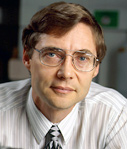Carl Wieman, associate director for science in the White House Office of Science and Technology Policy, presents the talk “A Scientific Approach To Science and Engineering Education” at 1:30 p.m. Thursday in the Stephen M. Ross School of Business Blau Auditorium.
Wieman was the founding Chair of the National Academy of Sciences Board on Science Education and has received numerous awards for his work on education. He says taking a research approach to teaching science and engineering now is revealing principles and practices that achieve much better learning than traditional approaches.

Wieman has conducted extensive research in atomic and laser physics. He shared the Nobel Prize in Physics in 2001 for the creation of a new form of matter known as Bose-Einstein condensate.
He was appointed associate director for science at the White House Office of Science and Technology Policy in September 2010. Previously, he divided his time between the University of British Columbia and the University of Colorado. At each institution, he served as both a professor of physics and the director of collaborative science education initiatives aimed at achieving widespread improvement in undergraduate science education.
The free event is open to the public. It is sponsored by the Office of the Vice President for Research.
From Africa to Ann Arbor: Peace Corps volunteer and former student reunite
By William Foreman
News Service
Working as a Peace Corps volunteer in Ghana teaching math and physics nearly 20 years ago, Brian Arbic knew that one of his best students was Joseph Ansong.
Arbic recalled thinking that Ansong, whom he last saw attending a school with poorly trained teachers, could have succeeded at U-M, where Arbic now is on the LSA and College of Engineering faculty.
After losing touch for decades, the teacher and his former pupil are back together again. Now colleagues, they work in offices next to each other in the Department of Earth and Environmental Sciences. Their improbable reunion is a story about the power of idealism, education, hard work and the enduring bonds between teachers and students.
Arbic will tell the story at 7 p.m. March 28 in a talk in the Hatcher Graduate Library Gallery, titled “On the University of Michigan, the Peace Corps, and the Enduring Bonds of Students and Teachers.”
Arbic will describe his experience as a Peace Corps volunteer and teacher in Liberia and Ghana, East Africa. He also will describe a surprise reunion with his prize pupil 20 years later and how that reunion led to Ansong being hired by Arbic’s lab.
The program is co-sponsored by the U-M Library, Environmental Sciences and the African Studies Center.

